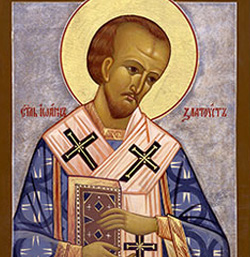Saint of the Day Online - St. John Chrysostom
Saint of the day online, Monday, September 13, 2017
13-09-2017
Saint Name: St John Chrysostom
Place: Antioch
Birth:349 C
Death: 407
Feast: September 13
St John Chrysostom who was born on c. 349 was the Archbishop of Constantinople and an important Early Church Father. He is known for his preaching and public speaking. St. John, named Chrysostom (golden-mouthed) on account of his eloquence, came into the world of Christian parents, about the year 344, in the city of Antioch. His mother, at the age of 20, was a model of virtue. He studied rhetoric under Libanius, a pagan, the most famous orator of the age.
He is known for his preaching and public speaking. His denunciation of abuse of authority by both ecclesiastical and political leaders, the Divine Liturgy of Saint John Chrysostom, and his ascetic sensibilities. The epithet Χρυσόστομος (Chrysostomos, anglicized as Chrysostom) means "golden-mouthed" in Greek and denotes his celebrated eloquence.Chrysostom was among the most prolific authors in the early Christian Church, exceeded only by Augustine of Hippo in the quantity of his surviving writings.
In 374, he began to lead the life of an anchorite in the mountains near Antioch, but in 386 the poor state of his health forced him to return to Antioch, where he was ordained a priest.
In 398, he was elevated to the See of Constantinople and became one of the greatest lights of the Church. But he had enemies in high places and some were ecclesiastics, not the least being Theophilus, Patriarch of Alexandria, who repented of this before he died. His most powerful enemy, however, was the empress Eudoxia, who was offended by the apostolic freedom of his discourses. Several accusations were brought against him in a pseudo-council, and he was sent into exile.
In the midst of his sufferings, like the apostle, St. Paul, whom he so greatly admired, he found the greatest peace and happiness. He had the consolation of knowing that the Pope remained his friend, and did for him what lay in his power. His enemies were not satisfied with the sufferings he had already endured, and they banished him still further, to Pythius, at the very extremity of the Empire. He died on his way there on September 14, 407.
John was ordained as a deacon in 381 by Saint Meletius of Antioch who was not then in communion with Alexandria and Rome. After the death of Meletius, John separated himself from the followers of Meletius, without joining Paulinus, the rival of Meletius for the bishopric of Antioch. But after the death of Paulinus he was ordained a presbyter (priest) in 386 by Evagrius, the successor of Paulinus.[17] He was destined later to bring about reconciliation between Flavian I of Antioch, Alexandria, and Rome, thus bringing those three sees into communion for the first time in nearly seventy years.
In Antioch, over the course of twelve years (386–397), John gained popularity because of the eloquence of his public speaking at the Golden Church, Antioch's cathedral, especially his insightful expositions of Bible passages and moral teaching. The most valuable of his works from this period are his Homilies on various books of the Bible.